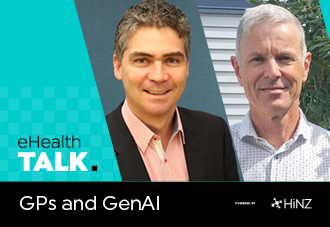GenAI helping GPs be doctors again
Monday, 4 March 2024
NEWS - eHealthNews.nz editor Rebecca McBeth  Around 400 Kiwi GPs are using a Generative Artificial Intelligence (GenAI) tool to assist in creating patient consultation notes, helping them feel less ‘shattered and shell shocked’ at the end of the day. Around 400 Kiwi GPs are using a Generative Artificial Intelligence (GenAI) tool to assist in creating patient consultation notes, helping them feel less ‘shattered and shell shocked’ at the end of the day.
GPs and primary healthcare leaders Karl Cole and Richard Medlicott spoke to eHealth Talk for the latest podcast episode – GPs and GenAI.
Both are using a tool called Copilot to listen in a transcribe patient consultations, and say it means they can focus on their patients, rather than their screens, during appointments.
Cole, who works as a GP in Papatoetoe, understands around 400 GPs have licenses to use Nabla Copilot in New Zealand and there are similar products available that are also in use.
Copilot is based around GPT-3, the language model built by OpenAI that is used to generate human text, and is powering hundreds of applications, including ChatGPT.
You’ve read this article for free, but good journalism takes time and resource to produce. Please consider supporting eHealthNews by becoming a member of HiNZ, for just $17 a month.
Cole describes his use of Copilot as the first time that a technology has helped him as a doctor to be more productive and feel less tired.
He tells eHealth Talk that GPs have increasingly had to become structured data coders while also doing their job, but the introduction of GenAI has flipped that scenario.
“This has made my job easier, I am back to being a real person-based doctor who looks at patient's eyes while I am talking to them, rather than a screen,” explained Cole on the podcast.
“It feels like someone's listening and taking notes for you: even if it is not a perfect note, you can just use parts of it.
“I am using it for most consultations. It is stopping me staying in the practice for another hour a day trying to catch up on my notes.”
Wellington GP Richard Medlicott says there is a global shortage of healthcare professionals and GPs are overworked and feeling the pressure.
He believes GenAI tools can not only save time for doctors, but also generate a set of patient instructions that can prevent patients coming to the practice because they have better information to manage their conditions at home.
Both Cole and Medlicott are advocates of OpenNotes, which involves making consultation notes available to patients via an online portal for them to read and review when needed.
“We want decreased cognitive load so that when you are seeing 15 patients in a session, at the end of it you are not feeling shattered and shell shocked, like we often are,” Medlicott says.
Copilot is saving him a couple of minutes per consultation and remembers things that he may have forgotten by the time it comes to writing up the notes later in the day.
However, it can misinterpret things and make mistakes so he always checks the summaries are accurate.
Medlicott is involved in developing a different GenAI tool, which will use Australasian servers, moving to New Zealand-based servers when these become available.
He says the way forward will be integration of these tools with the patient management system (PMS), so it automatically adds a new blood pressure reading or diagnosis into the medical record.
“We are really under the pump at the moment and we need something to change. This is our best shot,” he says in the lastest episode of eHealth Talk.
Medlicott adds that the first 1000 patients at his practice were asked explicitly for their consent to use the AI tool in the background of consultations. “Noone batted an eyelid” and were generally very positive and interested, he says.
Health NZ - Te Whatu Ora has issued guidance that staff must not use GenAI tools for clinical purposes at this stage, but says “safe and appropriate uses that help our staff and the population of Aotearoa NZ may well be developed in the near future.”
GPs are not employees of Health NZ.
Listen to the latest eHealth Talk podcast episode – GPs and GenAI – wherever you get your podcasts.
Otago University is conducting a study on the use of AI clinical notes support tools in primary care, saying use of tools such as Nabla Co-pilot have increased rapidly in Aotearoa in the last few months; but little is known about how and why GPs are using these tools.
“It is essential that we and the RNZCGP understand your perspective on the potential benefits and risks of AI clinical notes tools in practice,” the study’s authors say. Respond here.
Picture: GPs and primary healthcare leaders Karl Cole and Richard Medlicott
To comment on or discuss this news story, go to the eHealthNews category on the HiNZ eHealth Forum
Read more Clinical Software news
Return to eHealthNews.nz home page
|